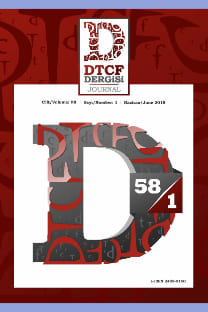CRITICISM AS MANIFESTO VERSUS CRITICISM AS SCIENCE: A NEW "BATTLE OF THE BOOKS" IN BRITISH MODERNIST LITERATURE
Manifesto Olarak Eleştiri Bilim Olarak Eleştiriye Karşı: Modernizm Çağında Yeni Bir "Eserler Savaşı"
___
- BALDICK, C. (2005). The Oxford English Literary History, Volume 10. 1910-1940: The Modern Movement. Oxford: Oxford University Press.
- BENNETT, E. M. (1979). From "James Joyce's Ulysses". In The Idea of Literature: The Foundations of English Criticism. (Ed. D. M. Urnov). (207-209). Moscow: Progress Publishers.
- BERTENS, H. (2005). Literary Theory: The Basics, London: Routledge.
- BLAMIRES, H. (1991). A History of Literary Criticism. London: Macmillan.
- COLLINI, S. (1992). "Introduction: Interpretation terminable and interminable". In Interpretation and Overinterpretation: Umberto Eco with Richard Rorty, Jonathan Culler, Christine Brooke-Rose. (Ed. S. Collini). (1-21). Cambridge: Cambridge University Press.
- DAICHES, D. (1981). Critical Approaches to Literature. London: Longman.
- DAY, G. (2008). Literary Criticism: A New History. Edinburgh: Edinburgh University Press.
- DIBATTISTA, M. (2000). "Virginia Woolf". In The Cambridge History of Literary Criticism, Volume 7: Modernism and the New Criticism. (Eds. A. W. Litz, L. Menand, and L. Rainey). (122-137). Cambridge: Cambridge University Press.
- ELIOT, T. S. (1950). The Sacred Wood: Essays on Poetry and Criticism. London: Methuen.
- ELIOT, T. S. (1999). Selected Essays. London: Faber and Faber Limited.
- FLETCHER, J. and M. Bradbury. (1991). "The Introverted Novel". In Modernism 1890-1930. (Eds. M. Bradbury and J. McFarlane). (394-415). London: Penguin Books.
- FORSTER, E. M. (1979). From "Aspects of the Novel". In The Idea of Literature: The Foundations of English Criticism. (Ed. D. M. Urnov). (193-194). Moscow: Progress Publishers.
- GILLIE, C. (1975). Movements in English Literature 1900-1940. Cambridge: Cambridge University Press.
- LAWRENCE, D. H. (1985). "John Galsworthy". In The Cambridge Edition of the Works of D. H. Lawrence: Study of Thomas Hardy and Other Essays. (Ed. Bruce Steele). (207-220). Cambridge: Cambridge University Press.
- LODGE, D. (1971). The Novelist at the Crossroads and Other Essays on Fiction and Criticism. Ithaca: Cornell University Press.
- LUBBOCK, P. (2007). The Craft of Fiction. Minneapolis: Filiquarian Publishing.
- MACSINIUC, C. (2002). Towards a Poetics of Reading: Poststructuralist Perspectives. Iaşi: Institutul European.
- MENAND, L. (2000). "T. S. Eliot". In The Cambridge History of Literary Criticism, Volume 7: Modernism and the New Criticism. (Eds. A. W. Litz, L. Menand, and L. Rainey). (17-56). Cambridge: Cambridge University Press.
- MILNER, A. (2005). Literature, Culture and Society. London: Routledge.
- NORRIS, C. (2001). "Literary theory, science and philosophy of science". In The Cambridge History of Literary Criticism, Volume 9: Twentieth Century Historical, Philosophical and Psychological Perspectives. (Eds. C. Knellwolf and C. Norris). (401-417). Cambridge: Cambridge University Press.
- O'GORMAN, F. (Ed.). (2002). The Victorian Novel. Oxford: Blackwell Publishing Ltd.
- ONEGA, S. and J. A. G. Landa. (1996). "Introduction". In Narratology: An Introduction. (Eds. S. Onega and J. A. G. Landa). (1-41). London: Longman.
- SANDERS, A. (1994). The Short Oxford History of English Literature. Oxford: Oxford University Press.
- WELLS, H. G. (1979). "The Contemporary Novel". In The Idea of Literature: The Foundations of English Criticism. (Ed. D. M. Urnov). (158-173). Moscow: Progress Publishers.
- WOOLF, V. (1979). "Modern Fiction". In The Idea of Literature: The Foundations of English Criticism. (Ed. D. M. Urnov). (195-202). Moscow: Progress Publishers.
- ISSN: 0378-2905
- Yayın Aralığı: 2
- Başlangıç: 1942
- Yayıncı: Ankara Üniversitesi Dil ve Tarih-Coğrafya Fakültesi
UNUTULMUŞLUĞUN KARANLIĞINDA BİR ŞAİR
NİKOLA VAPTSAROV'UN EDEBİ YARATICILIĞI VE TÜRKÇE'YE KAZANDIRILAN ŞİİRLERİ 1
ABİDİN PAŞA'NIN ANKARA VALİLİĞİ
RÉFLEXIONS SUR L'ANGOISSE DE LA MORT: GILGAMESH, DOMRUL LE FOU ET MONTAIGNE
SOVIET KOREAN (KORYO-IN) IN CENTRAL ASIA AND KOREAN RELIGIOUS ACTIVITIES IN POST-SOVIET
PANIUMLU PRİSCUS BİR MÜVERRİHİN ENTELEKTÜEL VE MESLEKİ PORTRESİNDEN KESİTLER
NİKOLA VAPTSAROV'UN EDEBİ YARATICILIĞI VE TÜRKÇE'YE KAZANDIRILAN ŞİİRLERİ 1
